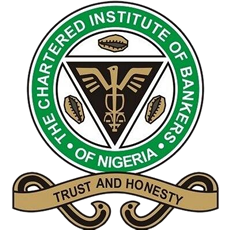
The City and Guilds of London Institute is an educational organisation in the United Kingdom. Founded on 11 November 1878 by the City of London and 16 livery companies to develop a national system of technical education, the institute has been operating under royal charter, granted by Queen Victoria, since 1900. The Prince of Wales, later King Edward VII, was appointed the first president of the institute.

The Chartered Management Institute (CMI) is a professional institution for management based in the United Kingdom. It was founded as the British Institute of Management (BIM) in 1947 or 1948, merged with the Institution of Industrial Managers (IIM) in 1992 to form the Institute of Management (IM), and gained a royal charter, and its present name, in 2002.

Nottingham University Business School (NUBS) is the business school of the University of Nottingham, United Kingdom situated on the university's Jubilee Campus, close to Nottingham city centre.
The Chartered Financial Analyst (CFA) program is a postgraduate professional certification offered internationally by the US-based CFA Institute to investment and financial professionals. The program teaches a wide range of subjects relating to advanced investment analysis—including business analysis, statistics, probability theory, fixed income, derivatives, economics, financial analysis, corporate finance, alternative investments, portfolio management—and provides a generalist knowledge of other areas of finance.

Founded in 1904, the Association of Chartered Certified Accountants (ACCA) is the global professional accounting body offering the Chartered Certified Accountant qualification (ACCA). It is the fourth-largest professional accounting body in the world, with 252,500 members and 526,000 future members. ACCA's headquarters are in London with principal administrative office in Glasgow. ACCA works through a network of over 110 offices and centres in 51 countries - with 346 Approved Learning Partners (ALP) and more than 7,600 Approved Employers worldwide, who provide employee development.

The Association of Accounting Technicians (AAT) is a UK-headquartered, global professional body for accounting technicians and bookkeepers, as well as a major provider of finance and accounting qualifications in the UK.
Ahmed Ali Al Sayegh is an Emirati politician who is a minister of state in the United Arab Emirates since 19 September 2018.

The Institute of Financial Accountants (IFA) is a professional accountancy body representing and providing certification for financial accountants in the United Kingdom. The IFA is a full member of the International Federation of Accountants.
Following is a partial list of professional certifications in financial services, with an overview of the educational and continuing requirements for each; see Professional certification § Accountancy, auditing and finance and Category:Professional certification in finance for all articles.
The Chartered Financial Planner is a qualification for professional financial planners and financial advisers awarded by the Chartered Insurance Institute.
The Chartered Banker Institute was established in 1875 and is the oldest professional banking institute in the world and the only remaining banking institute in the UK. It aims to help rebuild public confidence in banks and bankers by developing and embedding high ethical, professional and technical standards. The institute offers a range of qualifications for banking and financial services.
The Association of International Accountants (AIA) is a professional accountancy body. It was founded in the UK in 1928 and since that date has promoted the concept of ‘international accounting’ to create a global network of accountants in over 85 countries worldwide.

ICS Learn, also known as International Correspondence Schools Ltd, is a provider of online learning courses in the UK. It was founded in 1889 in Scranton, Pennsylvania. The UK branch was set up in 1904, and it now serves around 25,000 current students. Its students are based in more than 100 countries, predominantly in the UK but also across the Middle East, Asia, and Ireland.

NCC Education Ltd. is a private provider and awarding body of English education. The company provides students with the opportunity to earn internationally recognized British qualifications by studying at one of its Accredited Partner Centres, either through the classroom or online.

The Chartered Institute for Securities & Investment (CISI) is a professional body for members of the financial and investment profession. It offers qualifications and resources for professional development, as well as setting standards of conduct and ethics for those in the industry.

The Chartered Institute of Bankers of Nigeria (CIBN) is the umbrella professional body for bankers in Nigeria. The CIBN was incorporated in 1976 as the Nigerian Institute of Bankers. It was chartered in 1990, and is now covered by the CIBN Act 5 of 2007. The Institute is authorized to regulate the banking profession, set standards for bankers, and to maintain professional ethics through sanctions against members. Corporate members include the Central Bank of Nigeria, the Nigeria Deposit Insurance Corporation and all Deposit Money Banks, Development Banks, Mortgage Banks, Micro Finance Banks and Discount Houses in Nigeria.

Sir Douglas Jardine Flint, is a British banker and former chairman of HSBC Holdings. He served from 2011 to 2017, having previously been finance director since 1995. He is chairman of Abrdn.
The Confederation of Tourism & Hospitality (CTH) is a specialist awarding organisation, offering vocational qualifications for the hospitality, culinary and tourism industries, worldwide.
Kensington College of Business (KCB) is an independent higher education institution located in Oxford Circus, London.
The Centre for the Study of Financial Innovation (CSFI) is a think tank established in 1993 that seeks to engage in and promote free and progressive discussion about the challenges and opportunities facing the modern financial services sector. The aim of our research is to open thought-provoking debate about the financial services, with a view to making the industry more transparent, more inclusive and, above all, more sustainable. Following many years of collaboration on events and debates, and on Financial World, LIBF’s quarterly magazine, CSFI formally joined LIBF in November 2022.











